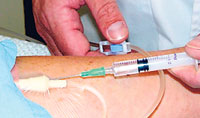A high-level probe is underway to ascertain how a large stock of pethidine injections, used as pain-killer, expired and had to be discarded a few weeks ago, while frantic efforts were on to airlift this essential and potent pain-killer as soon as possible from India.
The Auditor-General's Department will carry out an investigation on how this stock of pethidine worth many millions expired, said a health source when contacted by The Sunday Times to ask whether short-expiry stocks had been brought into the country.
This source, however, declined to comment how such a fiasco could have occurred and whether in fact the stocks had short-term expiry dates.
Another source explained that the use of pethidine had dropped although stocks had been ordered on estimates, as another drug, fentanyl, had become more popular for some conditions.
 |
| Pethidine a potent painkiller |
Regarding the difficulty in obtaining new stocks, as pethidine comes under Drug Schedule 3 (it is a habit-forming narcotic and has to be strictly controlled and monitored), a third source said that both the importing and exporting countries mandatorily had to issue narcotics licences.
“As it is addictive, all orders for pethidine are placed through the Medical Supplies Division (MSD) and procured by the State Pharmaceuticals Corporation. This drug is distributed even to the private sector only by the MSD," he said, adding, "therefore, getting it at short notice is not easy."
"Having identified Belco Pharma in Haryana, India, as having stocks that Sri Lanka can secure, moves are underway to get the Indian authorities to expedite the issuance of the narcotics licence. Sri Lanka has already issued the one on our side," the source said.
The Health Ministry has got in touch with both Sri Lanka's High Commission in India and the Trade Consul-General's Office in Mumbai to intervene with the Indian authorities to expedite the issuance of the narcotics licence there, The Sunday Times learns.
The licence is expected by Monday or Tuesday and the stocks would be airlifted immediately thereafter on Wednesday, the source said.
There has been no delay in procurements, another source assured. He claimed that when the supplier of the expired pethidine said that though the marked shelf-life was over it could be used for another six months without any adverse effect on the patients.
The top-level Technical Advisory Committee formed under the Cosmetic Devices and Drugs Act rejected the suggestion and ordered that the stock should not be used.
But patients have not been affected, as morphine is being used instead of pethidine in casualty management while tramadol is being administered in the case of obstetric (maternity) need, another source said.
Asked whether usually morphine was not given because it had higher addictive properties than pethidine, the source denied it was so and said both were addictive and that was why both had to be administered under the supervision of doctors.
Medical sources were concerned about the shortage of pethidine in the light of the ongoing war in the north, with soldiers having to undergo amputations and other surgical procedures, needing this pain-killer.
"Pethidine is cost-effective and less addictive than all the others. If morphine is given to the mother during childbirth the baby gets addicted," a doctor pointed out, with most reaching consensus that pethidine is the drug of choice. |

